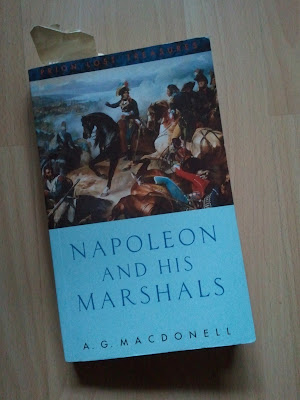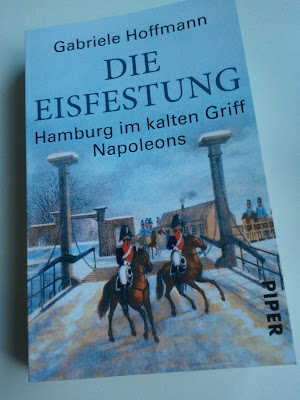Reading Roger Parkinson´s biography of Marshal Blücher I was confronted, more than in other military biographies, by the physical and emotional strain of military life, and command in particular. It may be Parkinson's inclusion of many fragments of Blücher's letters to his wife, in which he is very frank about his ailments and condition, that pointed this to me so strongly.
What I want to do in the following, is to sketch the elements of physical and emotional hardships to which the Hussar General and his contemporaries were exposed. This is probably not a complete list and I would appreciate if any reader would use the comment section to provide further suggestions and examples.
Throughout the book you get a good idea of how tough it was to be a commander in the Napoleonic age. The challenges were physical and mental, and sometime both at the same time. The marshal is also a good example of how commanders dealt with the stress.
The Physical
Campaigning was hard business. Commanders were expected to travel long distances on horseback on the march and on the battlefield. This was also not particularly comfortable, with bad roads and lots of cross country riding, so it helped to be an experienced rider. Since this was the fastest and most flexible mode of transport, commanders only reluctantly switched to carriages. Blücher did this only when he was not fit enough to travel on horseback, but never in battle.
Apart from travel, commanders spent time on administrative duties although Blücher was happy to leave that to his staff. Correspondence with other general officers and political could not be delegated as easily.
Although for officers accommodation was often much better than for the rank and file, there are a number of instances where even the Prussian commander in chief slept on the field wrapped in a cloak. Because of the amount of travel and other duties in a day, sleep was mostly short and night were often broken with urgent messages. Most letters to the home front contained some reference to tiredness.
In these conditions and with full exposure to the weather, it is not surprising that illness was a regular feature of campaign life, and Blücher caught a few bad ones in addition to some recurring ailments. When worn out he would often complain of inflammation of his eyes, which reduced his sight. After the victorious battle of Laon, the marshal's health failed completely and he was unable to exert effective command for weeks.
The Mental
Command was draining emotionally as much as physically. The responsibility for the lives of so many and the political consequences of failures were high. Throughout the campaigns of 1813 to 1815, Blücher was driven by his memory of the humiliation of 1806 and the near dissolution of the Prussian state as a result. Knowing the ability of Napoleon to bounce back from defeat, he drove as hard as possible to make the most of his victories by hot pursuit and keeping pressure to keep his enemy off balance.
Responsibility became personal when it led to the loss of close colleagues, friends and relatives. Blücher was deeply shaken by the death of his friend and chief of staff Scharnhorst.
Leadership also included overcoming opposition from your own side. Corps commanders Yorck and Langeron posed considerable challenges to Blücher's authority. Differences of opinion would mix with conflicts of character to ruin plans and paralyse operations. Blücher's letters to his wife are full of frustrations over missed opportunities and misinterpreted communications.
But superiors could prove as troublesome as subordinates. Monarchs intervened in campaigns out of political considerations, reducing the freedom of the field commander. The 1813-1814 campaigns were particular examples of this due to the presence of the monarchs in the theatre of operations. Blücher was so disappointed in the lenient terms of the Paris peace treaty in 1814 that he offered the King his resignation. This soured his relationship with his old friends Gneisenau and Hardenberg in the early stages of the Waterloo campaign.
High command could be a very lonely place. Although the Prussian marshal was relatively open and friendly with his staff, French marshals were known to be withdrawn and reluctant to share information and privacy with their subordinates. Ney, who had been a fairly approachable general, changed to a more reticent nature when he became a marshal and often dined alone. The deepest emotions could often only be shared with close relatives. Blücher, Ney and Davout poured out their hearts to their wives in their letters, but saw them very seldomly.
Where The Twain Meet
But the biggest and most traumatic element of command was combat. With the importance of example and intervention on the battlefield, commanders often exposed themselves in the front lines to rally retreating troops, to react to enemy moves and to lead attacks. Cannon balls would reach furthest, but generals were often close enough to the front to be within musket range or even get tangled up in melee.
Considering the state of battlefield surgery and medicine, getting wounded was life treathening even if not immediately lethal. So it was proved by Blücher's chief of staff Scharnhorst, who died in June 1813 of a neglected wound.
As a cavalry commander, Blücher would often lead its charges. In one such instance at the close of the battle of Ligny, his horse was wounded by a musket ball, and fell upon him. The quick reaction of his adjudant Nostitz prevented his capture by French cavaly, but his fall left him unconscious for several hours and he only came to in the nick of time to direct the Prussian army towards Wavre, rather than Liège.
At Lützen (or Groß Görschen as the Prussians would argue), a musket ball grazed his back as he led yet another cavalry charge. This superficial wound made horse riding most uncomfortable, with the wound occasionally opening again.
Nevertheless, it is clear that the old hussar was in his element in this environment and his staff often had to urge him to be more cautious. So physical courage should be considered a necessary condition for a field command. It was so much part of the officer ethos that I have found very few examples from this age admitting fear. If officers talked about disgust or emotion, it was mainly over exceptionally brutal behaviour, such as after storming of cities.
But the case of Blücher's son Franz is a good illustration of the mental impact of a physical wound. Blücher junior was wounded by a blow to the head (probably at the battle of Dresden) and captured by the French. Although he returned to active service after his liberation from a French hospital in the autumn of 1813, he later developed a mental condition (post traumatic stress disorder?) which led to his institutionalisation until his death. This was a cause for much grief to his father.
Release Or Breakdown
Even though most of these men can be considered experienced campaigners who had seen it all, it is clear that the trauma and stress was too big to shrug off. So they found release in alcohol, gambling, dancing and sex. The field marshal was very fond of the first three (even raking up such debts in his later years that he needed to ask his monarch to help out) but I have found no reference to the latter. Given the common occurrence of mistresses and prostitutes in this period among his colleagues, I think it unlikely that Blücher would not have joined in the fun.
Sometimes even that was not enough. Wellington, prime example of the Etonian stiff upper lip, was moved to tears after Waterloo. But it could get worse...
It seems that the iron will of the marshal sometime pushed him over the edge. His most celebrated mental breakdown occurred in the years after Jena and Auerstädt, when he was sidelined as commander in Pommerania while he saw Prussia constantly humiliated by Napoleon. He developed hallucinations and even claimed that he was pregnant with an elephant. This condition lasted for several months.
The story of Blücher´s physical collapse in March 1814 also shows how precarious the hierarchy was. Hallucinating and blinded by infected eyes, he was restricted to bed and incapable of command. When Gneisenau started to issue orders in the absence of the chief, experienced but troublesome corps commander Yorck almost immediately handed in is resignation and could only be recalled by waking Blücher temporarily from his hallucinations.
Gneisenau, although a great chief of staff, seemed paralysed by the responsibility and the senior corps commander, French émigré in Russian service, Count Langeron also stepped back. The decision was therefor made to keep the patient in nominal command until he recovered. But the army was effectively immobilised for almost two weeks.
And by the summer of 1815, the old marshal finally had had his fill of warfare, as he wrote in a letter to his wife. He longed for home, his wife and quiet.











